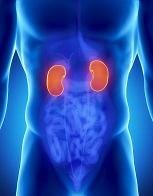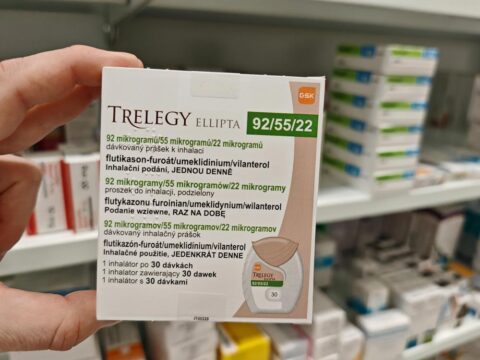Advertisment
ASCO GU Report 2013 – Small renal cancers may not need surgery

by Eoghan McNeill – Orlando, Florida – When clinicians observe incidental kidney masses, about 78% of the time they are surgically removed – but a new study suggests that watching and waiting to see if those masses are dangerous may be a safer strategy for older and sicker patients.
“Surveillance is a reasonable option for patients with small kidney tumors who are older or have considerable co-morbid conditions,” said William Huang, MD, assistant professor of urologic oncology at the New York University Langone Medical Center, in presenting his research at the 9th Genitourinary Cancers Symposium.
Dr. Huang – who defined small masses as those that were 4 centimeters in diameter or less – reported that median survival was 64 months among those who opted for surveillance compared with 57 months for patients who had surgery.
The researchers scrutinized the United States’ Surveillance, Epidemiology, and End Results (SEER) cancer registry data linked with Medicare claims (2000 to 2007). They observed:
–Observation was associated with a 49% decreased risk of experiencing a cardiac event (p < 0.00001).
–Overall, 3% of patients – 131 individuals — died of kidney cancer but treatment approach did not affect cancer specific survival. (p=NS)/
–After a median follow-up of 59 months, 24% of patients had experienced at least one cardiovascular event and 21% of patients had died.
Surveillance over time was associated with significant lower risk of death from any cause – and the risk continued to be reduced the longer the patients survived, Dr. Huang said.
He noted that about two-thirds of the kidney cancers discovered in patients in the United States fall into the category of small renal masses. “There tumors represent a heterogeneous group of tumors with varying malignant potential,” he said. “Emerging evidence suggests that surgical intervention in older or morbidly ill patients may be unnecessary and may also adversely affect non-oncologic outcomes.”
Patients 66 years or older were selected for the retrospective study. Surveillance was defined by the absence of a claim for surgery with in the first 6 months following diagnosis
Of the 7,148 patients identified in the study with a pathological diagnosis of kidney cancer, 5,564 underwent surgery and 1,584 were observed; 65% of those treated surgical underwent radical nephrectomy and 35% had nephron-sparing surgery, the researchers said.
“In this non-randomized retrospective cohort study surveillance of small kidney tumors did not increase the risk of dying of kidney cancer,” Dr. Huang said. “Surgical treatment (particularly radical nephrectomy) was associated with cardiovascular complications and poorer survival over time.”
However, Dr. Huang noted, “A number of small kidney tumors can become lethal over time; therefore, surgery remains the treatment of choice for patients with a normal life expectancy.”
The symposium, attended by more than 2,400 doctors, researchers and allied health care professionals, is co-sponsored by the American Society of Clinical Oncology, the American Society for Radiation Oncology and the Society of Urologic Oncology.
—
Presentation title: Abstract 343: Surveillance for the management of small renal masses: Utilization and outcomes in a population-based cohort.
343 Oral Abstract Session C, Sat, 10:00 AM-11:50 AM and General
Poster Session C (Board #A2), Sat, 6:45 AM-7:55 AM and
11:50 AM-1:05 PM
Surveillance for the management of small renal masses: Utilization and outcomes in a
population-based cohort.
William C. Huang, Laura C. Pinheiro, Paul Russo, William Thomas Lowrance, Elena B. Elkin; NYU School of Medicine, New
York, NY; Memorial Sloan-Kettering Cancer Center, New York, NY; Huntsman Cancer Institute, University of Utah, Salt
Lake City, UT
Background: Small renal masses (SRM) are comprised of a heterogeneous group of tumors with some having malignant potential. Although surgery is the standard treatment for SRMs, emerging data suggests that surgery in the elderly or morbidly ill patients may be unnecessary and may adversely impact non-oncologic outcomes. We analyzed a population-based cohort of patients to identify predictors of surveillance and assess the impact of surveillance on overall survival, kidney cancer-specific survival and cardiovascular (CV) events, compared with surgery.
Methods: From surveillance, epidemiology, and end results (SEER) cancer registry data linked with Medicare claims, we performed a retrospective cohort study of patients 66 years of age or older who received surgery or surveillance for SRM (, 4 cm) diagnosed between 2000 to 2007. Propensity score methods were used to control for potential confounders in multivariable analysis.
Results: Of 8,317 patients, 5,706 (70%) underwent surgery and 2,611 (31%) underwent surveillance. The use of surveillance increased from 25% in 2000 to 37% in 2007 (p , 0.001). During a median follow-up of 58 months, 2,053 (25%) patients had at least one CV event and 2,078 (25%) patients died, including 277 (3%) who died of kidney cancer. Compared with surgery, surveillance was associated with a significantly lower risk of death from any cause (hazard ratio [HR], 0.84; CI, 0.75-0.94) and of suffering a CV event (HR, 0.79; CI 0.70-0.89), controlling for patient and disease characteristics. Kidney cancer-specific survival did not differ by treatment approach (HR, 0.89; CI, 0.66-1.21).
Conclusions: There is increasing utilization of surveillance as an initial treatment strategy for patients with SRMs. For older patients with SRM, surveillance does not appear to adversely affect kidney cancer-specific survival, while surgery may be associated with CV complications and an increased risk of death from any cause. Surveillance should be considered an option for patients with SRM who are not otherwise acceptable candidates for surgical treatment.





